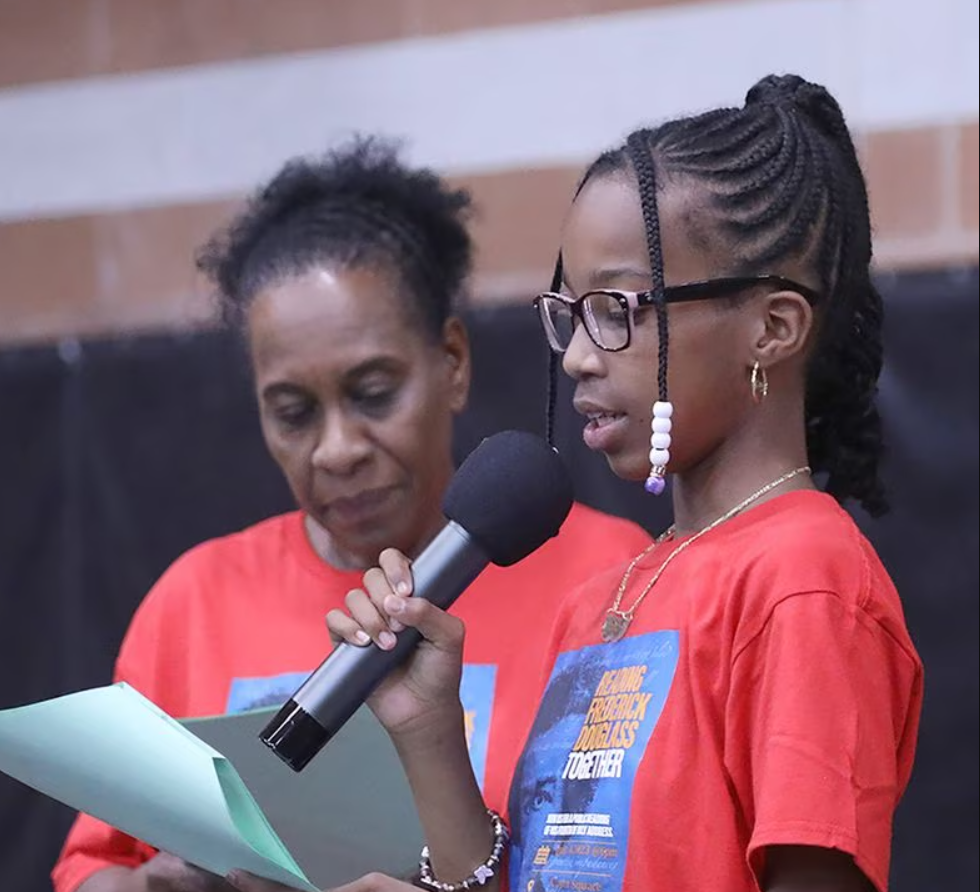By Aprell May Munford | AMunford@repub.com

SPRINGFIELD – More than three dozen people came out this week in Springfield to reflect on the deeper meaning behind abolitionist Frederick Douglass’ influential address, “What to the Slave is the Fourth of July?”
Springfield was one of several communities in Massachusetts where people gathered this Independence Day to read and talk about Douglass’ address.
This was Easthampton resident Myra Oyedemi’s first time attending a reading. “Hearing the speech in its entirety was profound,” Oyedemi said. “I am thankful for Juneteenth where I can have an equivalent moment of freedom to celebrate.”
After escaping slavery in 1838, the famous abolitionist and former slave lived for many years in Massachusetts.
The reading of the Frederick Douglass Fourth of July Address, “ What to the Slave is the Fourth of July?”
“Douglass met John Brown in Springfield and even delivered speeches in Court Square,” Michelle Toni McComb, the Springfield’s reading organizer, said.
Douglass delivered the speech over 171 years ago, on July 5, 1852, to the Rochester Ladies’ Anti-Slavery Society in Rochester, New York. In the address, Douglass denounces slavery and forcefully examines the Constitution and gaps between the country’s actions and aspirations.
Kathrine Stevens, director of grants at Mass Humanities, said a Reading Frederick Douglass Together Program started in 2009.
“Other Black and interracial communities had been reading the speech for some time and Mass Humanities took it up to help expand the movement,” Stevens said. “In 2019, there were 12 readings. This year’s grant supported 41 communities across the state.”
Each year on the Boston Common, near a monument to the 54th Regiment, legislators, students and members of the public take turns reading Douglass’ speech aloud.
Hearing it in different languages and voices dramatizes the country’s current diversity, Stevens said.
The reading of the Frederick Douglass Fourth of July Address “ What to the Slave is the Fourth of July?”
Springfield audience
A portion of Springfield readers were fourth- and fifth-graders who attend the Martin Luther King Jr. Family Services afterschool program. Others were college students, residents and the first poet laureate of Springfield, María Luisa Arroyo Cruzado, who read half the speech in Spanish.
McComb worked with students in the afterschool program to prepare them to understand the speech.
“Education is imperative for all ages, all walks of life, on every level and the speech is still holding true today,” McComb said.
Carolyn A. Cushing, poet laureate of Easthampton, attended the event in Springfield. She said events like these are significant. “That is important because people are trying to keep information like this out of places,” Cushing said.
The Reading Together Program celebrates Douglass’ oratorical skills, while also confronting racial trauma.
Cushing says that while Douglass praises the Founding Fathers, he reminds listeners that the ideals of freedom and liberty were not available to all. “We still need to be reminded of that. He ends with hope — and if he could have hope, then we too can have hope and take action to make it so,” she said.
The program in Springfield has been gaining popularity over the years. Despite rain and a last-minute change of location, this year’s event drew a big crowd.
People are looking for something to do on the holiday in response to social injustice and in protest, Stevens said.
Alert to trauma
As more people take part, Mass Humanities has worked to ensure people are not traumatized by what they hear.
A guide the group created provides facilitators with steps to take.
“Douglas celebrates yet criticize the ideals of freedom, justice and liberty, reflects on the past while making meaning for the present and this speech still lets us do that,” Stevens said. “Hearing the speech on the Fourth of July gives us an opportunity to reflect on the question whether America is living up to its ideas.”
The guide provides a framework for facilitating potentially difficult, uncomfortable conversations, said its author, Latoya Bosworth, the Mass Humanities program officer who coordinates the Douglass initiative.
According to Bosworth’s guide, racial trauma is the cumulative effect of racism on an individual’s mental and physical health.
Symptoms can be observed in people of all ages, in Black and brown communities, and are linked to feelings of anxiety, depression and physical health issues.
McCombs said tough conversations often take place after readings.
“We will ask if anybody has any questions about the speech, and then participants will use the trauma-informed manual to set the tone and guide the conversation,” she said. “It’s about making sure there’s a good tone with the discussion. This is my second year hosting the reading and so far, it has been good.”
Other readings are scheduled in Sharon July 9, in Fall River July 23, in Longmeadow July 28, in Hadley Sept. 23, and in Peabody Dec. 14.
